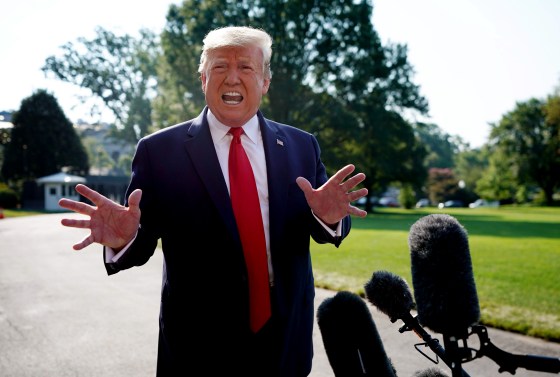WASHINGTON — President Donald Trump acknowledged Thursday that he had spoken with Israeli officials about the planned visit of Reps. Ilhan Omar and Rashida Tlaib to the country this weekend, just hours after Israel announced they had reversed course and would prohibit the pair from entering the country.
"I don’t want to comment about who I spoke to, but I think my social media statement pretty well speaks for itself," Trump told reporters as he traveled from his summer getaway in New Jersey to New Hampshire for a campaign rally. "But I did speak to people over there.”
Trump began the day by tweeting in favor of banning the congresswoman from visiting Israel.
“It would show great weakness if Israel allowed Rep. Omar and Rep. Tlaib to visit,” Trump wrote on Twitter Thursday morning. “They hate Israel & all Jewish people, & there is nothing that can be said or done to change their minds. Minnesota and Michigan will have a hard time putting them back in office. They are a disgrace!”
"Representatives Omar and Tlaib are the face of the Democrat Party, and they HATE Israel!," Trump continued on Twitter later in the afternoon.
When asked by reporters on his way to New Hampshire why he felt the need to speak about the congresswomen's trip — an unusual matter for a president to weigh in on — Trump pointed to their positions on Israel as justification.
"I am only involved from the standpoint of they are very anti-Jewish and they are very anti-Israel," Trump said. "I can't imagine why Israel would let them in, but if they want to let them in, they can, but I can't imagine why they would do it."
"I think it would be a terrible thing, frankly, for Israel to let these two people who speak so badly about Israel to come in," Trump continued.
Trump's acknowledgement that he had communicated with the Israelis comes as White House press secretary Stephanie Grisham had denied on more than one occasion that Trump was pressuring the Israeli government to bar Omar and Tlaib.
"The Israeli government can do what they want. It's fake news," Grisham said on Saturday. She stood by her statement on Thursday afternoon, telling reporters that Trump "wasn't" trying to impact Israel's decision.
On Thursday, Israel's deputy foreign minister said on Israeli state radio that the country had decided not to allow Tlaib and Omar to enter.
"We will not permit someone who negates our right of existence in the world to enter the country," said Deputy Foreign Minister Tzipi Hotovely.
Netanyahu confirmed the ban, saying in a statement that the congresswomen "are leading activists in promoting boycott legislation against Israel" adding that they had only made plans to visit the West Bank and "have avoided seeking any meeting with an official Israeli official."
In July, Israel's ambassador to the U.S., Ron Dermer, said the freshman lawmakers would be allowed to visit "out of respect for the U.S. Congress and the great alliance between Israel and America."
Omar and Tlaib have been critical of Israel and outspoken about their support for Palestinians and the pro-Palestinian Boycott, Divestment, Sanctions movement, known as BDS. Under Israeli law, supporters of the movement can be denied entry to Israel.
Omar in particular has sparked controversy for comments that critics said relied on anti-Semitic tropes, such as suggesting that politicians who support Israel do so for money. Omar's comments received backlash from both sides of the aisle, and she apologized under pressure.
Trump’s Thursday morning tweet was the latest attack he has made against the congresswoman. Last month Trump tweeted that Omar and Tlaib, along with their House colleagues Alexandria Ocasio-Cortez of New York and Ayanna Pressley of Massachusetts, all women of color, should "go back" and fix the "crime infested places" they "originally came from."
At a campaign rally in North Carolina last month, Trump was criticized for allowing the crowd to chant "send her back" in reference to Omar.

